英语作文:浪费食物是可耻的
- 格式:docx
- 大小:15.84 KB
- 文档页数:2
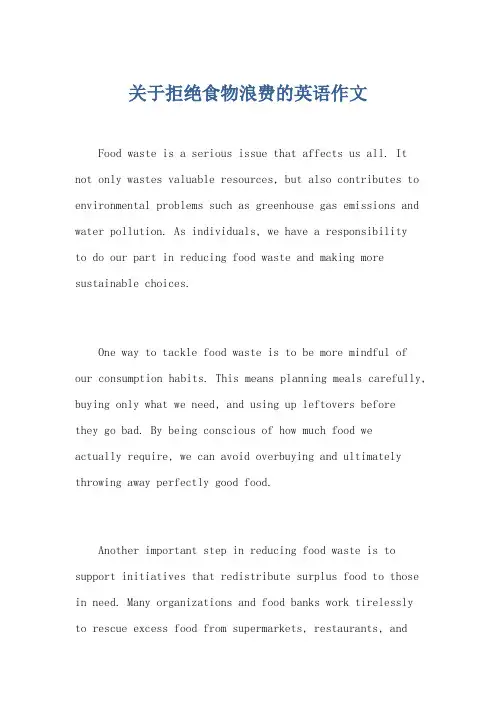
关于拒绝食物浪费的英语作文Food waste is a serious issue that affects us all. It not only wastes valuable resources, but also contributes to environmental problems such as greenhouse gas emissions and water pollution. As individuals, we have a responsibilityto do our part in reducing food waste and making more sustainable choices.One way to tackle food waste is to be more mindful of our consumption habits. This means planning meals carefully, buying only what we need, and using up leftovers beforethey go bad. By being conscious of how much food weactually require, we can avoid overbuying and ultimately throwing away perfectly good food.Another important step in reducing food waste is to support initiatives that redistribute surplus food to those in need. Many organizations and food banks work tirelesslyto rescue excess food from supermarkets, restaurants, andfarms, and distribute it to people facing hunger. By donating to or volunteering with these organizations, we can help ensure that food is being used to its fullest potential.Furthermore, we can also get creative in the kitchen and find ways to repurpose food scraps that would otherwise be discarded. For example, vegetable peels can be used to make flavorful broths, stale bread can be transformed into croutons or breadcrumbs, and overripe fruits can be blended into delicious smoothies. By thinking outside the box and being resourceful, we can minimize waste and maximize the use of every ingredient.In addition to individual efforts, businesses and policymakers play a crucial role in combating food waste. Restaurants can implement portion control measures andoffer smaller serving sizes, while grocery stores can discount perishable items nearing their expiration date. Governments can also implement policies that incentivize food producers and retailers to donate surplus food ratherthan dispose of it, as well as invest in infrastructure for composting and food waste recycling.Ultimately, the fight against food waste requires a collective effort from all sectors of society. By working together to raise awareness, change consumption patterns, and support innovative solutions, we can make a significant impact in reducing food waste and building a more sustainable future for generations to come. Let's all do our part in saying no to food waste and yes to a healthier planet.。
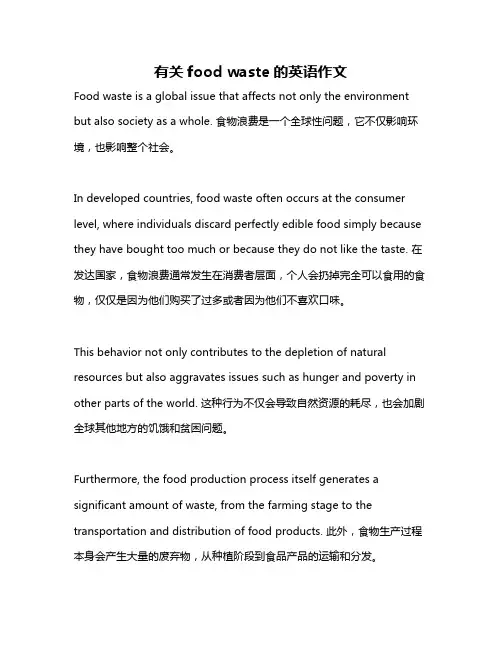
有关food waste的英语作文Food waste is a global issue that affects not only the environment but also society as a whole. 食物浪费是一个全球性问题,它不仅影响环境,也影响整个社会。
In developed countries, food waste often occurs at the consumer level, where individuals discard perfectly edible food simply because they have bought too much or because they do not like the taste. 在发达国家,食物浪费通常发生在消费者层面,个人会扔掉完全可以食用的食物,仅仅是因为他们购买了过多或者因为他们不喜欢口味。
This behavior not only contributes to the depletion of natural resources but also aggravates issues such as hunger and poverty in other parts of the world. 这种行为不仅会导致自然资源的耗尽,也会加剧全球其他地方的饥饿和贫困问题。
Furthermore, the food production process itself generates a significant amount of waste, from the farming stage to the transportation and distribution of food products. 此外,食物生产过程本身会产生大量的废弃物,从种植阶段到食品产品的运输和分发。
The environmental impact of food waste is immense, as decomposing food releases methane gas, a potent greenhouse gas that contributes to climate change. 食物浪费对环境的影响是巨大的,因为腐烂的食物会释放甲烷气体,这是一种对气候变化有影响的强效温室气体。
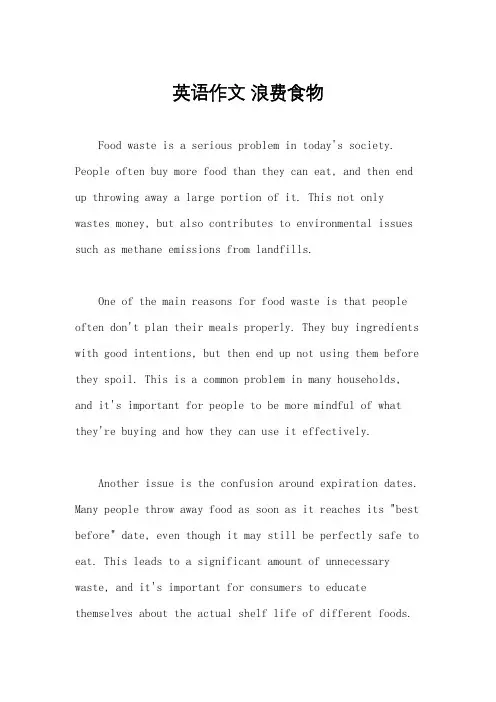
英语作文 浪费食物 Food waste is a serious problem in today's society. People often buy more food than they can eat, and then end up throwing away a large portion of it. This not only wastes money, but also contributes to environmental issues such as methane emissions from landfills.
One of the main reasons for food waste is that people often don't plan their meals properly. They buy ingredients with good intentions, but then end up not using them before they spoil. This is a common problem in many households, and it's important for people to be more mindful of what they're buying and how they can use it effectively.
Another issue is the confusion around expiration dates. Many people throw away food as soon as it reaches its "best before" date, even though it may still be perfectly safe to eat. This leads to a significant amount of unnecessary waste, and it's important for consumers to educate themselves about the actual shelf life of different foods. Restaurants and grocery stores also contribute to food waste. Buffets, for example, often throw away large amounts of unsold food at the end of the day. Similarly, grocery stores may discard products that are approaching their expiration date, even if they are still perfectly edible. It's crucial for businesses to find more sustainable solutions for managing their surplus food.
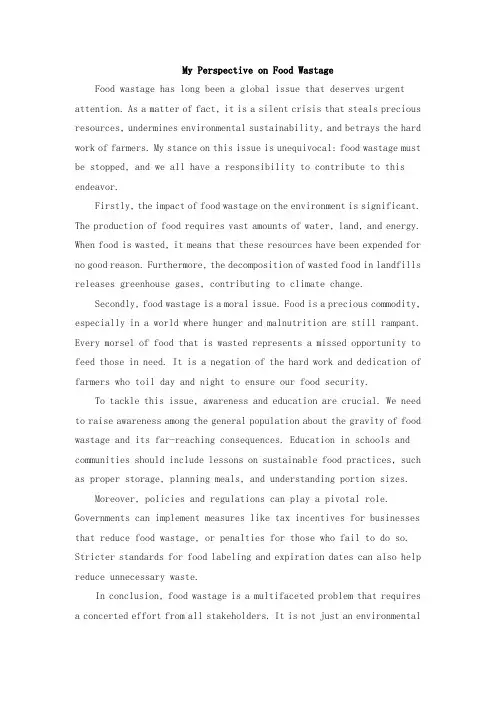
My Perspective on Food WastageFood wastage has long been a global issue that deserves urgent attention. As a matter of fact, it is a silent crisis that steals precious resources, undermines environmental sustainability, and betrays the hard work of farmers. My stance on this issue is unequivocal: food wastage must be stopped, and we all have a responsibility to contribute to this endeavor.Firstly, the impact of food wastage on the environment is significant. The production of food requires vast amounts of water, land, and energy. When food is wasted, it means that these resources have been expended for no good reason. Furthermore, the decomposition of wasted food in landfills releases greenhouse gases, contributing to climate change.Secondly, food wastage is a moral issue. Food is a precious commodity, especially in a world where hunger and malnutrition are still rampant. Every morsel of food that is wasted represents a missed opportunity to feed those in need. It is a negation of the hard work and dedication of farmers who toil day and night to ensure our food security.To tackle this issue, awareness and education are crucial. We need to raise awareness among the general population about the gravity of food wastage and its far-reaching consequences. Education in schools and communities should include lessons on sustainable food practices, such as proper storage, planning meals, and understanding portion sizes.Moreover, policies and regulations can play a pivotal role. Governments can implement measures like tax incentives for businesses that reduce food wastage, or penalties for those who fail to do so. Stricter standards for food labeling and expiration dates can also help reduce unnecessary waste.In conclusion, food wastage is a multifaceted problem that requires a concerted effort from all stakeholders. It is not just an environmentalissue but also a moral one. Each of us has a role to play in reducing food wastage, whether it is through mindful consumption, supporting sustainable food practices, or advocating for stronger policies. By working together, we can make a significant impact in addressing this silent crisis and ensuring a more sustainable future for all.。
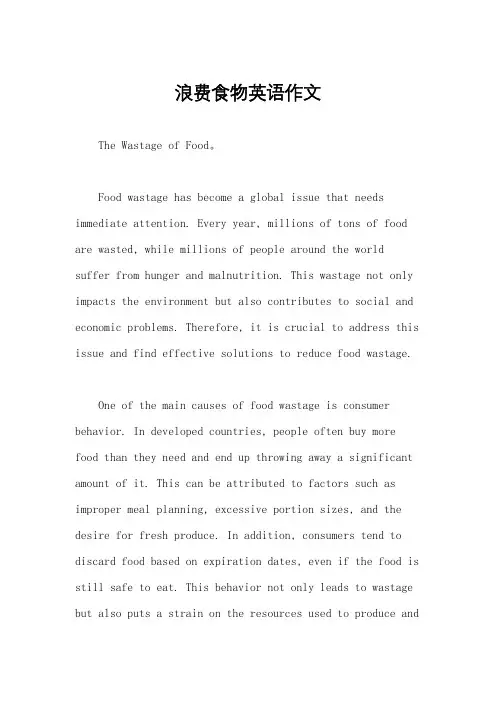
浪费食物英语作文The Wastage of Food。
Food wastage has become a global issue that needs immediate attention. Every year, millions of tons of food are wasted, while millions of people around the worldsuffer from hunger and malnutrition. This wastage not only impacts the environment but also contributes to social and economic problems. Therefore, it is crucial to address this issue and find effective solutions to reduce food wastage.One of the main causes of food wastage is consumer behavior. In developed countries, people often buy more food than they need and end up throwing away a significant amount of it. This can be attributed to factors such as improper meal planning, excessive portion sizes, and the desire for fresh produce. In addition, consumers tend to discard food based on expiration dates, even if the food is still safe to eat. This behavior not only leads to wastage but also puts a strain on the resources used to produce andtransport the food.Another factor contributing to food wastage is the lack of proper storage and transportation facilities. In many developing countries, inadequate infrastructure and poor refrigeration systems result in a significant amount offood spoilage before it reaches consumers. This isespecially true for perishable items such as fruits, vegetables, and dairy products. Improving storage and transportation facilities can help reduce food wastage and ensure that more food reaches those in need.Food wastage also occurs at the production level. Farmers often face challenges such as unpredictable weather conditions, pests, and diseases, which can lead to crop failures. In order to meet the demands of the market, farmers tend to overproduce, resulting in a surplus of food. However, due to lack of proper storage and distribution systems, a significant portion of this surplus goes to waste. By improving farming techniques, implementing better pest control measures, and establishing efficient supply chains, food wastage at the production level can beminimized.To address the issue of food wastage, it is essentialto raise awareness among consumers, farmers, and policymakers. Consumers should be educated about the consequences of food wastage and encouraged to adopt sustainable practices such as meal planning, proper storage, and utilizing leftovers. Farmers should receive support and training to improve their farming practices and reduce crop losses. Policymakers should develop and implement policies that promote sustainable agriculture, efficient supply chains, and food redistribution programs.In conclusion, food wastage is a global problem that needs to be urgently addressed. By changing consumer behavior, improving storage and transportation facilities, and implementing sustainable farming practices, we can significantly reduce food wastage and ensure that more people have access to nutritious food. It is our collective responsibility to take action and make a positive impact on the world's food system.。
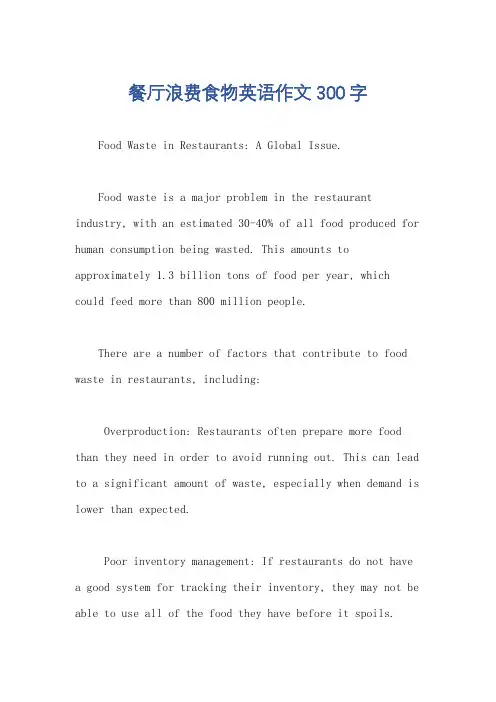
餐厅浪费食物英语作文300字Food Waste in Restaurants: A Global Issue.Food waste is a major problem in the restaurant industry, with an estimated 30-40% of all food produced for human consumption being wasted. This amounts to approximately 1.3 billion tons of food per year, which could feed more than 800 million people.There are a number of factors that contribute to food waste in restaurants, including:Overproduction: Restaurants often prepare more food than they need in order to avoid running out. This can lead to a significant amount of waste, especially when demand is lower than expected.Poor inventory management: If restaurants do not have a good system for tracking their inventory, they may not be able to use all of the food they have before it spoils.Inadequate storage: Food that is not stored properly can quickly spoil, leading to waste.Lack of customer awareness: Customers often do not realize how much food is wasted in restaurants, and they may not make choices that help to reduce waste.Food waste in restaurants has a number of negative consequences, including:Environmental impact: Food waste contributes to greenhouse gas emissions, water pollution, and air pollution.Economic impact: Food waste costs restaurants money, and it can also lead to higher food prices for consumers.Social impact: Food waste deprives people in need of food.There are a number of things that restaurants can do toreduce food waste, including:Improving inventory management: Restaurants can use technology to track their inventory and forecast demand more accurately.Reducing portion sizes: Restaurants can offer smaller portion sizes, which can help to reduce waste.Using food scraps: Restaurants can use food scraps to make soups, stocks, and other dishes.Composting food waste: Restaurants can compost food waste, which can help to reduce greenhouse gas emissions.Consumers can also play a role in reducing food waste in restaurants. Here are a few tips:Be mindful of your food choices: When you order food, choose dishes that you are likely to finish.Ask for a smaller portion: If you are not sure howhungry you are, ask for a smaller portion.Take leftovers home: If you do not finish your meal, ask for a to-go box.Be aware of food waste: The more you know about food waste, the more likely you are to make choices that help to reduce it.Food waste is a serious problem, but it is one that can be solved. By working together, restaurants and consumers can reduce food waste and all its negative consequences.。
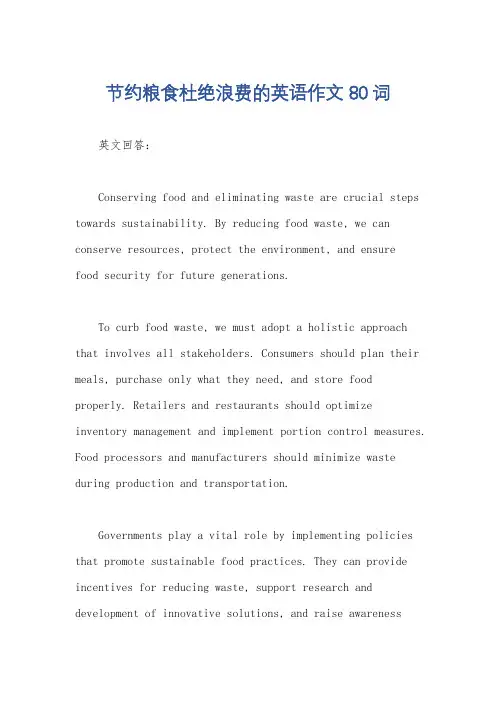
节约粮食杜绝浪费的英语作文80词英文回答:Conserving food and eliminating waste are crucial steps towards sustainability. By reducing food waste, we can conserve resources, protect the environment, and ensurefood security for future generations.To curb food waste, we must adopt a holistic approach that involves all stakeholders. Consumers should plan their meals, purchase only what they need, and store food properly. Retailers and restaurants should optimizeinventory management and implement portion control measures. Food processors and manufacturers should minimize waste during production and transportation.Governments play a vital role by implementing policies that promote sustainable food practices. They can provide incentives for reducing waste, support research and development of innovative solutions, and raise awarenessabout the importance of food conservation.By working together, we can create a society that values food and recognizes its importance. We can build a future where everyone has access to safe and nutritious food, and where food waste is a thing of the past.中文回答:节约粮食杜绝浪费是走向可持续发展的重要举措。
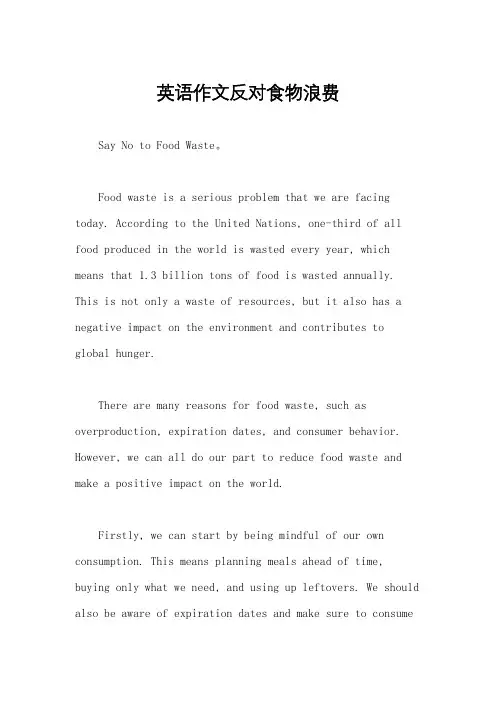
英语作文反对食物浪费 Say No to Food Waste。 Food waste is a serious problem that we are facing today. According to the United Nations, one-third of all food produced in the world is wasted every year, which means that 1.3 billion tons of food is wasted annually. This is not only a waste of resources, but it also has a negative impact on the environment and contributes to global hunger.
There are many reasons for food waste, such as overproduction, expiration dates, and consumer behavior. However, we can all do our part to reduce food waste and make a positive impact on the world.
Firstly, we can start by being mindful of our own consumption. This means planning meals ahead of time, buying only what we need, and using up leftovers. We should also be aware of expiration dates and make sure to consume food before it goes bad. Secondly, we can support businesses and organizations that are committed to reducing food waste. Many supermarkets and restaurants have started initiatives to donate excess food to charities or compost it instead of throwing it away. By supporting these businesses, we can encourage others to follow their lead.
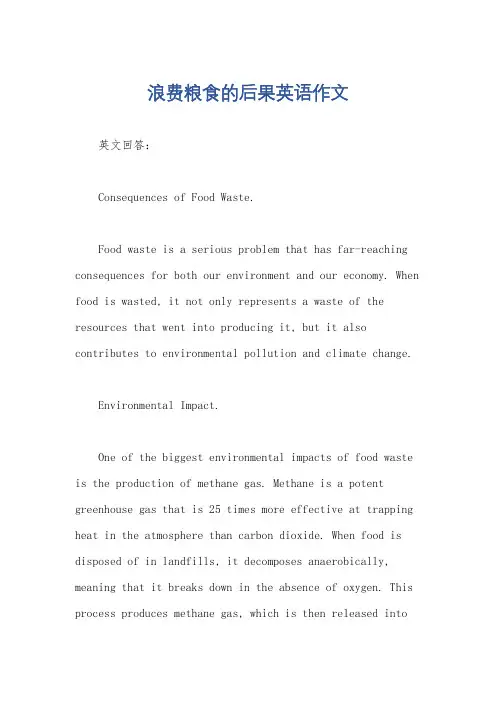
浪费粮食的后果英语作文英文回答:Consequences of Food Waste.Food waste is a serious problem that has far-reaching consequences for both our environment and our economy. When food is wasted, it not only represents a waste of the resources that went into producing it, but it also contributes to environmental pollution and climate change.Environmental Impact.One of the biggest environmental impacts of food waste is the production of methane gas. Methane is a potent greenhouse gas that is 25 times more effective at trapping heat in the atmosphere than carbon dioxide. When food is disposed of in landfills, it decomposes anaerobically, meaning that it breaks down in the absence of oxygen. This process produces methane gas, which is then released intothe atmosphere.In addition to methane production, food waste also contributes to water pollution. When food is disposed of in landfills, it can leach nutrients and other contaminants into the groundwater. These contaminants can then travel through the soil and into surface water bodies, where they can harm aquatic life and human health.Economic Impact.Food waste also has a significant economic impact. In the United States, it is estimated that $161 billion worth of food is wasted each year. This wasted food could be used to feed the hungry, reduce food insecurity, and create new jobs.Social Impact.Food waste also has a negative social impact. When food is wasted, it means that less food is available for those who need it. This can lead to increased food insecurity andhunger. In addition, food waste can contribute to poverty and social unrest.Solutions.There are a number of things that can be done to reduce food waste. These include:Reducing food waste at home: There are a number of things that consumers can do to reduce food waste at home, such as:Planning meals ahead of time.Buying only the food that you need.Storing food properly.Eating leftovers.Composting food scraps.Reducing food waste at the retail level: Retailers can reduce food waste by:Selling produce that is not perfect in appearance.Offering discounts on food that is close to its expiration date.Donating excess food to food banks and other charities.Reducing food waste at the farm level: Farmers can reduce food waste by:Planting crops that are more resistant to pests and diseases.Using more efficient farming practices.Harvesting crops at the optimal time.Selling produce directly to consumers throughfarmers' markets and CSAs.Conclusion.Food waste is a serious problem that has far-reaching consequences for our environment, our economy, and our society. There are a number of things that can be done to reduce food waste, and it is important that we all work together to find solutions to this problem.中文回答:粮食浪费的后果。
英语作文:浪费食物是可耻的
锄禾日当午,汗滴禾下土。谁知盘中餐,粒粒皆辛苦。
下面是xx为大家整理的优秀英语作文,欢迎阅读与借鉴,
谢谢!
It Is Shame To Waste Food
Nowadays with the development of our society and
the world most people have no need to worry about
suffering famine.
The general level of people’s living standard has
been improved dramatically. As most people have enough
food to eat so they don’t treasure it even waste.
Actually it is not easy to grow or produce food. It needs
a long time and great energy. Moreover there are still
many poor places in the world whose people don’t have
enough food. They still have to worry about dying of
hunger. Knowing this don’t you think it is shame to
waste food?
In my view no matter what situation we are in bad
or good we should not waste food.
如今,随着社会和世界的发展,大部分人都不需要担心
遭受饥荒。
人民的生活水平总体上有了极大的提高。大多数人都有
足够的食物吃,所以他们不珍惜,甚至开始浪费了。事实上,
种植或者生产食物是很不容易。需要很长的时间和精力。此
外,世界上还有很多贫困的地方,那儿的人没有足够的食物。
他们仍然担心饿死。了解到这一点,难道你不觉得浪费食物
很可耻?
在我看来,无论我们处于什么样的情况,好的或不好的,
我们都不应该浪费食物。